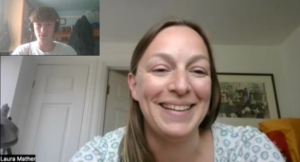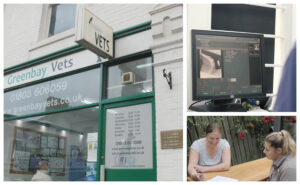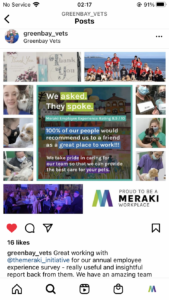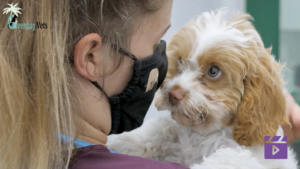by Luke Harris, Marketing Intern
Exeter University, UK
Created 1084 days ago
Feature Interview: Meet Greenbay Vets, Our Founding Community Member
For this month’s feature interview, I spoke to Laura Mather who is the co-owner, alongside her husband John, and a practicing veterinary surgeon at Greenbay Vets in Devon. Greenbay was the first practice to come on board and join the Meraki Initiative.
I asked Laura a few questions about the working life at Greenbay vets and what she feels makes her colleagues ‘tick’. But also, I was curious to find out what it is like to be a Meraki practice and the benefits she has experienced from having a workplace profile, in addition to having used Meraki’s videography services, and employee experience survey.
As a marketing intern and being a ‘fresh-face’ in the veterinary profession, the conversation with Laura provided an excellent window into the profession’s unique characteristics, its day-to-day working life, and most importantly the people at its core.

Tell me a little bit about you and your background in the veterinary profession
I have been a vet since 2009, and my husband and I bought Greenbay vets in 2014. Although I still do veterinary work, a large part of my job is now managing the practice in a practice manager and leadership role.
How did you take your experiences as a vet into building the day-to-day worklife at Greenbay Vets?
We wanted our own practice so that we could do things our way. From working at other practices you learn what you like and don’t like. We wanted Greenbay to be a workplace where we had the time to do the job properly, as we found that in previous practices it was really pushed for time which meant you couldn’t do the job as well as you hoped. We also don’t refer very much, which means there are good opportunities for our team to see their cases all the way through.
My husband and I had our own special interests, myself in imaging and cardiology and my husband in surgery, and we have been able to really pursue those interests and invest in a lot of equipment and training.
We also wanted to encourage our team in their own special interests as well. A lot of our veterinary surgeons and nurses have additional qualifications that the practice has supported them with so they can find their niche. If different people have different interests, you can provide a really good service to the pet and the pet owner. It makes the team work well together because you can bounce ideas off each other.

On your Meraki profile you completed the EMS placement section, is this something that is important to you?
Really important. We love teaching, but we also normally learn from them as well, because they have been taught the latest information from different areas in our ever-changing field.
Longer term it is a great way to meet future colleagues, one of our vets we met through her placement with us. We can get a feel for whether someone is a good fit for the team, and they get a good feel for whether the practice is a good match for them.
How did the team (and animals!) enjoy being a part of your videography piece filmed by Meraki?
We were quite daunted about doing it. The idea of being videoed is often out of a lot of people’s comfort-zone in our profession. We were really chuffed about the individuals who volunteered to be in it, and to see them being positive was amazing. None of the owners or the animals minded being videoed!
It was great to show the practice and the area where we work as we are lucky to live in a lovely area, and you can’t really get that across in a normal job advert. We also have a shortened version we use on social media as well. I think it is a good thing to do and hopefully more veterinary practices will do it
How important is it to you to have open conversations with your colleagues?
A lot of practices don’t make time for that. If we had a client complaint, for example, my husband likes to go for coffee and chat about it rather than pulling them into the office. This gives people the opportunity for them to say things they might otherwise not.
We have a formal one-to-one with everybody at least once a year, where we cover their professional and personal development. A lot of these sorts of conversations come up much more informally by catching up with people and finding out what they are interested in. The team come to us rather than us having to ask them.
Libby, one of your student nurses stated in your video she feels she can ask a question to anyone. How important is that to you as an employer?
Really important. We try to have an open-door policy for the management. Much of the chat at Greenbay is informal, and just someone knocking on the door and saying ‘can I ask something?’ is important from a clinical point of view, and a patient safety point of view. If they feel like they can’t double check something or ask why something is being done, you risk poor outcomes.
 Putting people at ease and allowing them to ask questions shines through in the fantastic results from your Meraki Employee Experience Survey. What did you find most useful about doing the survey?
Putting people at ease and allowing them to ask questions shines through in the fantastic results from your Meraki Employee Experience Survey. What did you find most useful about doing the survey?
It was very detailed feedback, and overall, really positive which is great because we try to do a good job! It is good to know people are happy and it highlights areas we need to work on or think about that we could do differently to support people. This enables people to have pride in their work.
Repeating the survey in 12 months’ time, we will compare and analyse whether anything we have put in place has made a difference.
While working with Meraki I have had my eyes opened to the challenges in the vet profession, like the retention crisis, and the shortage of vets.
We have always tried to ensure everyone is happy at work. It is easy to get swallowed up into a spiral of negativity especially on social media that there aren’t any vets, and you see posts from students saying, ‘what am I getting myself in for?’. This is really sad, because there are lots of workplaces which will support them.
Was this one of the drivers for you joining Meraki?
We aim to promote positivity and Meraki is a great way of doing that through our video and blog posts, to put yourself out there as what we are like to work for. If more practices do that it will help people to find the right place for them. We see Meraki as a solution, rather than just focusing on negatives and problems.

How has completing your Meraki profile impacted you as a leader?
For Greenbay, we want to stay independent, develop our team, and help them pursue their interests. Meraki makes me reflect on what the most important parts are for the practice, and it has made me think ‘what could I do to improve that particular area?’. Having the profile as a structure is helpful because leadership can be overwhelming, and it helps to think about the different areas from your employees’ point of view.
What are your ‘Top Tips’ to enable a better working environment where people love to work?
- People need the time to do the job to the level they want. Feeling like you have not done the job well enough is a big source of stress.
- The right resources, equipment, and facilities are necessary to do the job well.
- Enable people to develop personally and professionally so they can feel more confident.
- It is quite a stressful profession and I can’t take that away completely, but it is important to have fun and a laugh at work.
Learn more about Greenbay Vets great workplace on their Meraki workplace profile here.
Enjoyed this article? To receive articles like this subscribe to our newletter on our landing page.


